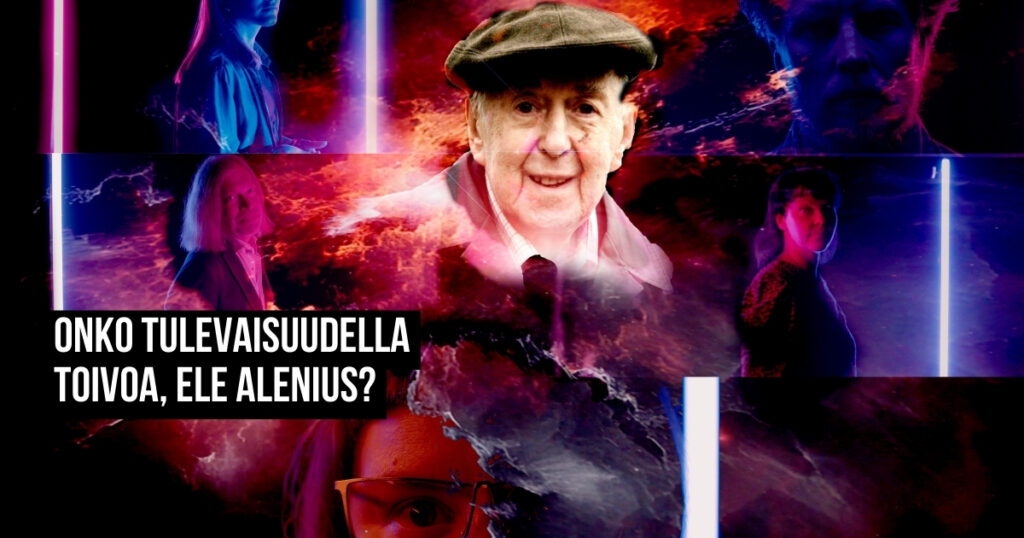
The documentary film is There Hope for the Future, Ele Alenius? provides insights into Ele Alenius’s (1925–2022) concept of planetarism. Planetarism examines the relationship between humanity and nature in the context of both the present and the future on a global scale.
Futurologists have spoken of a crisis of political imagination, where our ability to find new solutions diminishes because we mainly perceive threats around us. This documentary creates space for imagining a better future that respects planetary boundaries and embraces a hopeful perspective. For Alenius, the ideals of democracy and enlightenment were guiding stars throughout his life, even when facing pressure from the Soviet Union.
Language of the film is Finnish, and the subtitles are provided in English.
Note! No admission fee may be charged for the film screening.
Discussions with Leading Thinkers
The film delves into profound questions based on previously unpublished interviews and video material featuring Finnish politician, non-fiction writer, and political scientist Ele Alenius. Director Sami Aleksi Hakkarainen weaves Alenius’s future-oriented thinking and life experiences into a discussion on today’s environmental, economic, and technological crises.
The documentary features Ele Alenius in conversation with young people, as well as former President Tarja Halonen and politician Erkki Tuomioja. Contemporary perspectives on Alenius’s views on democracy and ecosocial issues are provided by:
- Professor of Social Pedagogy Arto O. Salonen
- Researcher in Sustainable Work, Associate Professor Eeva Houtbeckers
- Expert in NGO Foresight and Development Noora Vähäkari
- Political History Researcher Noora Kotilainen
- Journalist and Entrepreneur Kaarle Hurtig
Host a Screening for Your Community
Would you like to watch the documentary with friends or your community and discuss the ideas it inspires? You can arrange your own screening by ordering the film from KSL Study Centre free of charge. Along with the documentary, you will receive material to deepen discussions on the film’s themes.
The documentary has a runtime of 1 hour and 16 minutes, and it can be watched in full or in segments. Language of the film is Finnish, and the subtitles are provided in English.
Steps for Organizing a Screening:
- Choose a suitable venue for your group. If possible, use a large screen or a projector for the best viewing experience.
- You will receive a Vimeo link to stream the documentary on a computer and display it on a screen or projector.
- If screening in a cinema, a video file will be provided.
- We offer guidance on organizing the screening if needed.
- Consider accessibility to ensure the event is inclusive:
- Is the venue accessible?
- The film includes subtitles in Finnish and English (selectable in settings).
- The beginning of the documentary contains flashing lights, so informing participants in advance is recommended.
- Topics such as war and nuclear war are discussed, so a content warning is advisable.
- You can also utilize KSL Study Centre’s safer space principles to foster a constructive atmosphere. These principles are available in English on our website.
- Tag us on social media: @kslopintokeskus.
Order your screening via this online form.
IMPORTANT! You will receive the video link within two weeks of ordering. If urgent, contact Cultural Producer Riina Näsi (riina.nasi at ksl.fi).
The Legacy of Ele Alenius
Politician, author, war veteran, and political scientist Ele Alenius (1925–2022) rose from a working-class family with socialist roots to serve as a Member of Parliament, Second Minister of Finance, Chairman of SKDL (Finnish People’s Democratic League, predecessor of Left Alliance), and a Board Member of the Bank of Finland. He was known as a politician who stood firm against pressure from the Kremlin and maintained Finland’s national self-respect and sovereignty as the leader of SKDL.
In his later years, Alenius dedicated himself to philosophical reflections on society and writing. He shifted his focus from daily politics to studying the broader trajectories of human development. Despite witnessing much change over his long life, he remained vibrant and hopeful even in old age. The ideals of democracy and enlightenment remained his guiding principles. His books on the future of the world earned him the Finnish Society for Futures Studies Award and the Humanist Award.